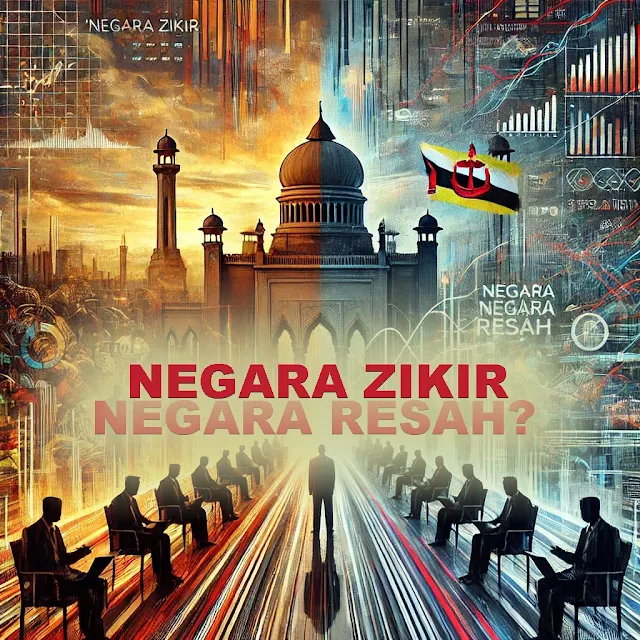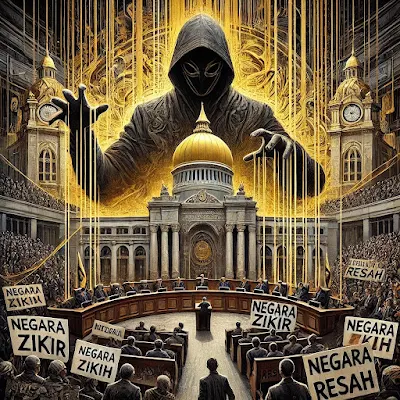What happens when policy debates reveal more questions than answers? When promises of reform clash with the reality of inefficiency?
By Malai Hassan Othman
BANDAR SERI BEGAWAN, MARCH 2025: Brunei’s 13th Day of the Legislative Council (LegCo) session laid bare the struggles of governance, from budgetary shortfalls to public frustration over policy stagnation.
What unfolded in the chambers was not just another political routine but a mirror reflecting inefficiencies, unkept promises, and deep-seated governance challenges.
Public Spending: A Bottomless Pit?
Brunei continues to struggle with unreliable water supply, housing backlogs, and stagnant economic development despite significant infrastructure spending.
The Minister of Development defended budget cuts of $62 million in JKR, particularly in maintenance funds while increasing spending on asset acquisitions.
However, this raises concerns - how will infrastructure remain functional if routine maintenance takes a backseat to new asset purchases?
Lawmakers also questioned the delayed execution of multiple flood mitigation projects despite available funding, reinforcing scepticism over the government’s ability to deliver on promised reforms.
The session saw intense exchanges over the declining quality of essential services. While ministers assured progress, the reality on the ground suggests otherwise.
The Minister of Development justified a $22.4 million budget increase for infrastructure, but concerns over delayed projects and accountability dominated discussions.
Meanwhile, JKR’s operational budget was slashed by $3.6 million, accompanied by job cuts.
How will efficiency improve when resources are dwindling and oversight remains weak?
Water Woes: Yellow Taps and Empty Promises
The yellowish, contaminated water crisis continues to haunt residents, particularly in Temburong and Lumapas.
The Minister of Development acknowledged the severity of the issue and revealed that a real-time water quality monitoring system is in the works, yet no clear timeline for its implementation was given.
Meanwhile, the expansion of the Batang Duri Water Treatment Plant from 5MLD to 20MLD is underway, but questions remain - will this be enough to resolve years of inadequate water supply, or just another project with delayed results?
Yellowish, contaminated water remains a recurring nightmare for many households despite repeated investments in water treatment plants.
Lawmakers pressed the government on accountability, questioning why these issues persist despite repeated budget injections.
The Minister admitted long-term planning is necessary, but for residents enduring discoloured, unsafe drinking water, the patience is wearing thin.
How long will Bruneians wait for a basic necessity?
Housing Nightmares: Abuse and Neglect
The Rancangan Perumahan Negara (RPN) scandal resurfaced, revealing how government-subsidized homes are being rented out for profit while genuine applicants remain homeless.
Lawmakers demanded stricter enforcement, transparency, and legal consequences for those exploiting the system.
RPN Lugu faced additional scrutiny, with revelations of structural flaws and substandard utility installations.
Residents struggling with faulty air-conditioning and water-heating systems questioned the quality of government-approved contractors.
Is housing a privilege or a failed policy experiment?
Job Crisis: Foreign Workers Over Bruneians?
The Minister of Development acknowledged that 58% of local construction companies failed to renew their business licenses due to financial mismanagement.
This further reinforces the challenges in local business development and the government's weak enforcement of localisation policies, leaving many Bruneians struggling for opportunities in their own industries.
Despite rising unemployment, foreign workers continue to dominate grass-cutting and maintenance contracts, sparking calls for stricter enforcement of localisation policies.
Lawmakers urged the redirection of grass-cutting and maintenance contracts to local cooperatives (MPK) to create employment opportunities for Bruneians.
The Minister of Development admitted that more than 5,000 foreign workers still dominate the construction sector, despite the existence of localisation policies.
Weak enforcement of Local Business Development (LBD) initiatives was blamed for the failure to integrate more local talent into the industry, leaving many Bruneians sidelined in their own country’s labour market.
Ministers acknowledged the concern but failed to offer clear commitments.
Is the government truly prioritising local employment, or is foreign labour dependency an intentional policy?
Poverty Alleviation or Welfare Trap?
Brunei’s poverty eradication success rate fell from 65% to 56%, highlighting inefficiencies in social welfare programs and the government's reliance on financial aid as a short-term fix.
The government’s reliance on financial aid was criticised, with lawmakers emphasising the need for mindset transformation, skill development, and self-reliance programs.
This issue belongs under the broader job crisis and economic development concerns, as it highlights structural weaknesses in supporting local businesses and ensuring sustainable employment for Bruneians.
The government’s reliance on financial aid was criticised, with lawmakers emphasising the need for mindset transformation, skill development, and self-reliance programs.
While zakat distribution improved, lawmakers scrutinised inefficiencies in collection, allocation, and transparency, citing inconsistencies in fund tracking, regional disparities in distribution, and past failures in managing zakat reserves, where large sums remained unused despite rising poverty levels.
Concerns were raised over delays in disbursement, the lack of proper tracking mechanisms, and whether the aid truly reaches the intended beneficiaries or simply fuels long-term dependency on financial support rather than fostering self-sufficiency.
The administrative burden of zakat management was questioned, with calls for a more efficient system that reduces bureaucratic inefficiencies, improves verification processes, and ensures funds are not misused for recurring aid without accountability on recipients' financial progress.
Some lawmakers called for an independent audit to determine whether zakat collection meets its intended goals, particularly in addressing the growing concerns over financial mismanagement, inefficient fund utilisation, and the expanded use of zakat to cover personal debts such as overdue housing payments, which could risk long-term dependency.
A key issue was whether zakat funds are effectively reducing poverty or merely shifting financial burdens, particularly with the growing trend of zakat being used to cover housing debts and social assistance, instead of fostering sustainable economic independence.
There was also debate on expanding eligibility criteria to ensure those in genuine need are prioritised.
The disconnect between policy intent and execution was a central theme, reinforcing the need for structural reforms to ensure zakat fulfils its role as a pillar of economic upliftment rather than just a stopgap measure.
Final Verdict: Governance in Crisis?
The 13th Day proceedings did more than just highlight national challenges - they underscored a systemic failure in governance, policy execution, and accountability.
Repeated budget allocations with minimal impact suggest that Brunei’s problems are not about funding but execution.
Until accountability is enforced, inefficiencies eliminated, and policies translated into tangible improvements, the same issues will resurface year after year.
For Bruneians who have heard the same promises year after year, the question is no longer how long must they wait? but rather, what will it take for real change to happen?
What are your thoughts on these pressing issues? Join the conversation and share your perspective on the future of governance in Brunei. (MHO/03/2025)



.jpeg)

%20proceedings.%20The%20image%20portra.jpg)

